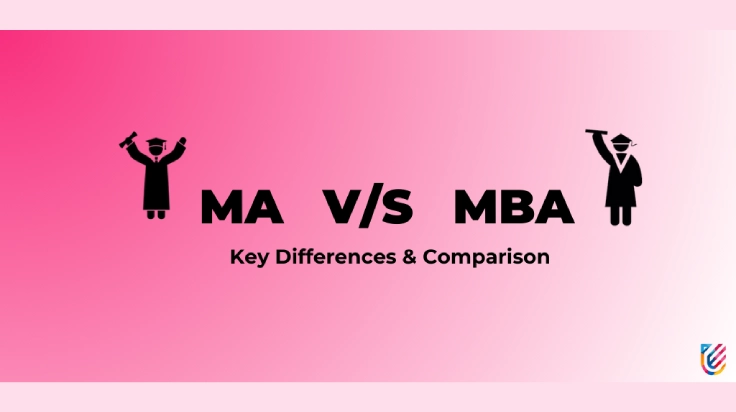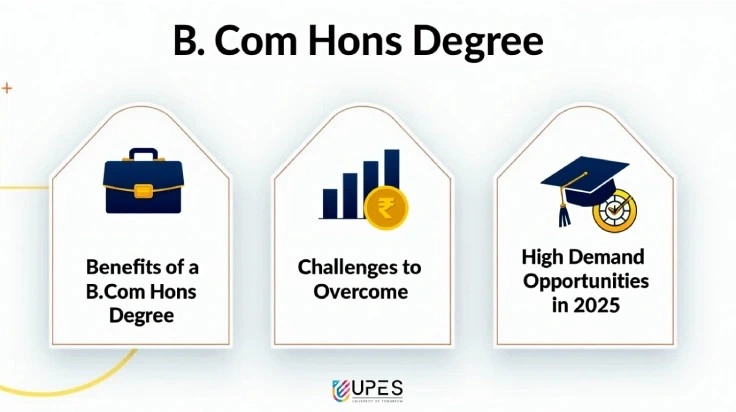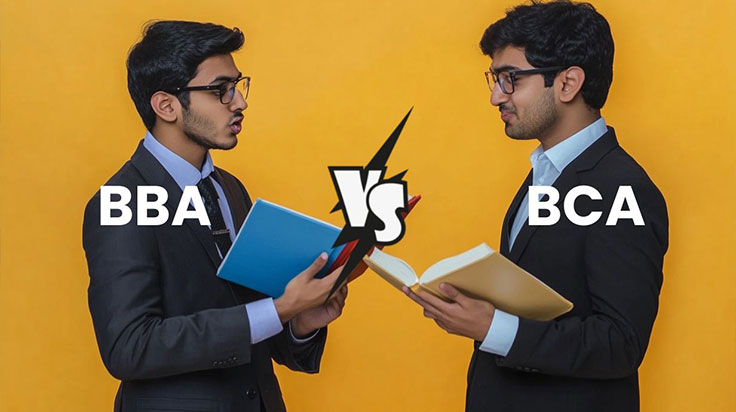MA vs MBA- Comparison & Choosing Factors
- UPES Editorial Team
- Published 05/03/2025

Table of Contents:
The time after completing graduation is often riddled with confusion. With the world open with opportunities, one often feels overwhelmed! Many students feel they are unable to decide which course, specialisation, stream to choose. Many are stuck in making the right choice between Masters Vs MBA. If you too are someone in the same crowd of MBA or MA, Congratulations, you have come to the right page. We will help you breakdown every query related to MA Vs MBA, and hopefully by the end of the blog, you will have answers to your deepest, insecure career conundrums.
Become future-ready with our Business programs
Know MoreAn Overview of MBA
An MBA or a master’s in business administration is a specialised business degree that equips you with the learning and the skills to run a business successfully and understand the core values and functioning of finance and management.
Both MA and MBA have the same social standing in the academic world, meaning both are post-graduate degrees, but masters and MBA difference lies in the skillsets they impart, the competitiveness of getting in them, prerequisites of getting enrolled, and more. For example, an MA doesn’t require some work experience, but an MBA does!
Benefits of Pursuing an MBA
Are you aspiring to master business’ nitty-gritties? Well, Enrol in an MBA program! Having an MBA degree from a top college/university, puts you on the map. You open billions of opportunities, both in your home country and abroad. You hone leadership skills, managerial skills, and specialised skills in marketing, business, finance, management, and more. An MBA allows you quick promotion at work, better roles, and increase in salary.
Early Requirements of an MBA Program
Getting into an MBA program of esteemed value is a hard nut to crack. Make sure you have good grades in college. Qualify the entrance exams with great percentile. You also must appear for GMAT and do exceptionally well. In some MBA colleges of India and abroad, it is essential to come up with some work experience. So, you can see there are many criteria that you’ll have to jump through to get into a prestigious MBA college.
Always go through the course requirements of the colleges/universities you are targeting to pursue MBA or MA. Many of them have their unique, personal criteria. Don’t mess with eligibility criteria ever!
An Overview of MA
An MA is a postgraduate degree you pursue for a more specialised, in-depth mastery of a particular subject. Usually, people pursue Master’s in the same subject of their graduation to solidify their knowledge, expertise, and more. Unlike MBA where you choose a specialisation, in an MA you choose a subject, meaning you pursue MA in English, Economics, Political Science, or. M.Sc. in Design, Physics, Chemistry, and more.
Benefits of Pursuing a Master’s degree
A Master’s program will have you gain mastery over your subject with detailed curriculum, reading materials, course requirements, and more. Having a master’s degree will help employers to see you considering expertise, knowledge, and intellect. You will gain better job opportunities, promotion at work, and a chance to switch careers, if need be.
Early Requirements of a Master’s Program
An MA is an easy degree to get into. You don’t even need a graduation degree in the same subject to be eligible for Master’s. Just qualify the entrance exam and you are good to go. You are not required to bring work experience with yourself.
Always go through the course requirements of the colleges/universities you are targeting to pursue MBA or MA. Many of them have their unique, personal criteria. Don’t mess with eligibility criteria ever!
Difference between Masters and MBA Course
Since we promised at the beginning of the blog that we’ll solve every query related to MA Vs MBA, and hopefully by the end of the blog, you will have answers to your deepest, insecure career conundrums, we bring to you a very detailed difference between Masters and MBA Course:
| Aspect | Master's Degree | MBA (Master of Business Administration) |
| Focus Area | Specializes in a particular discipline such as science, arts, or engineering. | Primarily centered on business and management with elective specializations. |
| Objective | Provides an in-depth understanding and theoretical knowledge in a specific field. | Equips individuals with practical business acumen, leadership, and strategic decision-making skills. |
| Duration | Generally takes 1-2 years, depending on the country and institution. | Typically lasts 1-2 years, with some accelerated programs offering shorter completion times. |
| Entry Requirements | Requires a bachelor’s degree in a relevant field, sometimes with specific prerequisites. | Open to graduates from any discipline, often requiring work experience and standardized test scores (GMAT/GRE). |
| Curriculum | Focuses on academic research, theoretical concepts, and may require a thesis or final project. | Integrates both theory and practice through case studies, group projects, internships, and hands-on learning. |
| Career Path | Prepares students for specialized roles in academia, research, or industry-specific careers. | Designed to develop future managers and leaders across various industries. |
| Networking | Facilitates connections within a specialized academic or industry-specific network. | Offers extensive networking opportunities with business leaders, alumni, and industry professionals. |
| Specializations | Concentrates on a particular subject area (e.g., Master of Science in Data Science, Master of Arts in History). | Provides multiple business specializations such as finance, marketing, operations, entrepreneurship, and more. |
| Flexibility | Usually follows a structured curriculum with limited elective choices. | More adaptable, with a combination of core courses and elective options that allow customization. |
| Cost | Generally more affordable than MBA programs, but costs vary by institution. | Typically more expensive due to business school prestige, global exposure, and extensive resources. |
| Job Opportunities | Focuses on careers within the chosen field of study. | Opens diverse career paths in management, consulting, finance, marketing, and entrepreneurship. |
| Global Recognition | Highly regarded worldwide for subject matter expertise. | Recognized globally as a qualification for leadership, management, and business-oriented roles. |
| Target Audience | Individuals looking for subject-specific expertise and academic advancement. | Professionals aiming for career growth in leadership, management, or strategic business roles. |
| Value in the Job Market | Valued for deep knowledge and specialization in a particular industry. | Highly valued for managerial capabilities, strategic thinking, and business leadership skills. |
| Examples of Degrees | Master of Science in Artificial Intelligence, Master of Arts in Political Science. | MBA with concentrations such as Finance, Marketing, Strategy, or Entrepreneurship. |
This refined comparison highlights key differences between an MA and an MBA, catering to distinct career aspirations and academic goals.
MA Vs MBA Which is Better
Who can deny both courses have good career options? Both the courses are worthy and come with personalised pros and cons. To help you get more refined knowledge, we will now delve into the pros and cons of MBA Vs Masters.
Advantages of Pursuing an MA:
An MA in the course of your choice, provides a specialised knowledge which allows you to delve deeply into the field of your study. This practise makes you an expert in that field. In many master’s programs you must write a dissertation for passing the degree. In the process of writing, you become familiar with the sphere of research. You can take your research forward by doing a Ph.D. Thus, we see how an MA degree helps you in establishing your position in research and provides an entry into academia.
An MA is available in many courses. Those wanting to switch field and career, can easily take up a Master’s degree in the field or course of your choice. Having the choice to explore various disciplines opens the opportunity to graduates to explore various industries and roles aligned with their expertise.
Another benefit of pursuing an MA is that it is of shorter duration and lesser cost. Most MA programs end in a year of two. After two years you gain the required skillsets to excel in the field of academia, teaching, research, public policy, art curation, publishing, and more. In comparison to an MBA, an MA is more affordable.
Disadvantages of Pursuing an MA:
An MA fails to provide you practical knowledge of business and management, both which are essential in the professional world, especially that of corporate. There also lacks a very robust networking opportunities in Master’s as compared to an MBA, causing a lack in forming professional contacts which later prove essential in job hunts and promotions.
Advantages of Pursuing an MBA:
MBA programs prepare graduates for leadership positions by offering a comprehensive education in a range of business topics, such as strategy, marketing, finance, and leadership.
MBA programs frequently emphasize the development of practical skills, which are highly valued in the corporate world and include leadership, problem-solving, and decision-making.
One of the best advantages of pursuing an MBA is that it allows you to foster global connections by interacting with experts, industry leaders, alumni, and more. This opens up your chances of getting better placed. If you wish to open a business, having the right entrepreneurial skillsets is a must. For that, an MBA is always the better choice.
Disadvantages of Pursuing an MBA:
An MBA Course fee is expensive. Getting into an MBA is highly competitive. The program is rigorous and demands complete attention and can soon get exhausting and overwhelming, if nit managed well. There is also a con of limited specialisation. You can pursue an MBA in one specialisation maximum.
These are some of the pros and cone of MA Vs MBA. Hope it clarifies more on MA Vs MBA which is better.
MBA Vs MA in Management
An MA in Management focuses on theoretical knowledge, research, and academic study of management principles, making it ideal for careers in research, academia, consulting, or policymaking. It emphasizes conceptual learning over practical business applications and is more affordable, usually requiring no prior work experience. In contrast, an MBA in Management is a professional degree designed to develop leadership, business strategy, and decision-making skills through case studies, networking, and hands-on learning. It prepares professionals for managerial roles in corporate sectors, consulting, finance, and entrepreneurship, often requiring prior work experience and higher tuition but offering strong career growth and salary potential. If you seek academic expertise and research, an MA is suitable, while an MBA is better for career acceleration, leadership roles, and business-oriented growth.
MA Vs MBA: Which one to Choose?
Before getting enrolled, make sure your factors of consideration are clear. Here listed below are some you can consider before opting either of the two:
- Choice of Learning: If you wish to gain knowledge and skillsets on marketing, finance, management, and more, go for an MBA. However, if you get high on philosophy, literature, arts, history, and likewise, choose MA.
- Switching Careers: If you wish to leave what you are doing and make a switch, both the degrees can be helpful depending on the new field you wish to explore, you’ll have to choose. For managerial, high-level senior roles, an MBA is the right choice.
- Financial Aspects: If you are low on budget but high on passion for knowledge and learning, pursuing an MA is the right choice for you. An MBA is a costly affair.
- Work experience: Work experience matters a lot with an MBA. If you have work experience and wish to gain a few points of leverage, go for an MBA. But if you don’t have work experience, going for master’s makes more sense.
Taking into all these factors as reliable points of consideration, you can choose which degree suits your personality, career goals, and ambitions more.

Our counsellors are just a click away.
Conclusion:
Just like one piece of clothing doesn’t fit all, one course doesn’t suit everyone. In the battle between MA Vs MBA, you will have to analyse your personality, career goals, financial situation, long-term ambition, and more to make a refined decision. For both MA and MBA, you can browse industry-relevant, globally designed courses by UPES, Dehradun. Visit their official website today to gain more information.
UPES Editorial Team
Written by the UPES Editorial Team
UPES Admission Enquiry
Subscribe to UPES Blogs
Join our community for exclusive stories, insights, and updates
By clicking the "Subscribe" button, I agree and accept the privacy policy of UPES.


















































